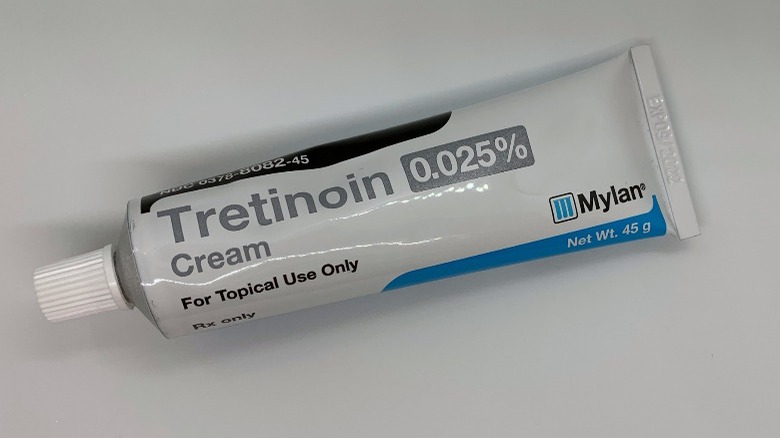Adapalene Vs. Tretinoin: Which Is Better For Sensitive Skin?
If you're a self-proclaimed skin care junkie, then you know that there are a ton of powerful ingredients out there that can sometimes do more harm than good. It is thought that the key to obtaining beautiful skin is finding quality products that your skin can tolerate. Two ingredients that may sound scary, but are actually quite gentle when used appropriately, are adapalene and tretinoin.
Both of these ingredients are derivatives of Vitamin A, and fall under the category of topical retinoids, according to Dear Brightly. Your next question might rightly be: What is a retinoid, exactly? (We're glad you asked.) Retinoids are chemical compounds which are typically only available via a dermatologist's prescription. However, a weaker variation, called retinol, can be found in over-the-counter (OTC) skin care products, according to Very Well Health.
Retinoids provide several benefits to the skin, including decreasing the appearance of wrinkles and lines, reducing inflammation, unclogging pores, and tackling hyperpigmentation. In many instances, highly potent topical retinoids are prescribed for conditions such as acne, psoriasis, and even certain types of cancer, according to Medical News Today. Being that adapelene and tretinoin are the two of the most common (and powerful) retinoids, you may be wondering which one is right for you, especially if you have sensitive skin.
Adapelene uses and side effects
Let's start with adapalene. This FDA-approved retinoid is available in both prescription form and OTC, and is the active ingredient in Differin, a popular topical gel prescribed for acne. Adapalene "penetrates hair follicles and helps prevent and treat acne, exfoliates skin, and minimizes inflammation," Dr. Tiffany Libby, a board-certified dermatologist, told Mind Body Green. It is also a third-generation retinoid, which means it has been studied a lot more recently than other retinoids.
One study actually showed a pretty good success-rate (around 74%) when it came to adapalene decreasing acne-induced inflammation (via Mind Body Green). The study, which was published in the journal Therapeutics and Clinical Risk Management in 2017 (posted at the National Library of Medicine), also notes that "adapalene is a good choice in the treatment of acne" because it has "less side effects [than other retinoids] and high efficacy confirmed by numerous clinical studies."
Adapalene, which has been prescribed to more than 40 million people in the past two decades, further helps to restore the skin's natural texture and complexion, per the Differin website. Some side effects of adapalene may include skin redness, skin itching, or mild burning. Additionally, your acne might worsen during the first 2-4 weeks of using this medication (this is called skin purging). Certain acids (i.e. alpha hydroxy acids, or products containing glycolic acid) should be avoided while using this retinoid, and one should also limit their usage of alcohol-containing products, such as toners or astringents, per WebMD.
Tretinoin uses and side effects
Tretinoin, on the other hand, is a bit of a veteran when it comes to retinoids — in fact, it was the first FDA-approved retinoid formulated for the treatment of acne, according to Mind Body Green. This retinoid, unlike adapalene, is only available by prescription because of its strength, and is the active ingredient in Retin-A. Tretinoin comes in the forms of topical gel, cream, and liquid (which is considered to be the most potent), according to Very Well Health.
"Tretinoin is another topical retinoid, derived from vitamin A, that also helps to prevent and treat acne," Dr. Libby told Mind Body Green. "It is more well studied for its anti-aging benefits and works to increase cell turnover, improving the thickness of the epidermis and minimizing fine lines while improving discolorations and treating acne."
However, despite all the seemingly wonderful benefits of tretinoin, it does have some drawbacks, particularly in that it can irritate the skin — redness, blisters, and even a possible change in skin pigmentation, according to Mind Body Green. This happens due to tretinoin's potency when activating cell turnover. Therefore, if you have skin that leans towards the sensitive side, you might want to avoid tretinoin and pick up some adapalene. As usual, we recommend talking to your dermatologist before trying any new products on your skin, especially those containing powerful ingredients.


